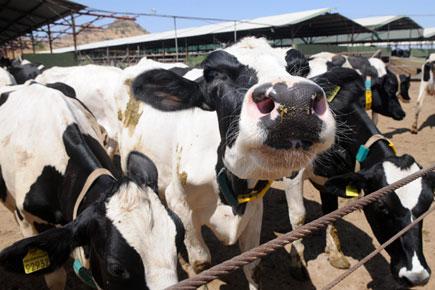A novel method of altering a protein in cow's milk to bind with an antiretroviral drug promises to greatly improve treatment for infants and young children suffering from HIV/AIDS, according to a new study

A novel method of altering a protein in cow's milk to bind with an antiretroviral drug promises to greatly improve treatment for infants and young children suffering from HIV/AIDS, according to a new study
Washington: A novel method of altering a protein in cow's milk to bind with an antiretroviral drug promises to greatly improve treatment for infants and young children suffering from HIV/AIDS, according to a new study.
ADVERTISEMENT

Representational Picture
One of the most commonly prescribed antiretroviral drugs for treating and preventing HIV infection, Ritonavir, has undesirable side effects and important oral-delivery problems. Its physicochemical properties challenge its administration to infants, said Federico Harte, associate professor of food science at Pennsylvania State University.
"Ritonavir has a high hydrophobicity and low solubility in water, which lead to a low dissolution rate in the gastrointestinal fluid and, hence, to insufficient bioavailability.
"The liquid formulation used to treat infants over one month of age contains 43 per cent ethanol and has an awful flavour that has been described as bitter-metallic, medicinal, astringent, sour and burning," Harte said. "Moreover, when coming into contact with the stomach mucosa, Ritonavir causes nausea, vomiting and diarrhoea.
Therefore, we need to develop alternative paediatric formulations of Ritonavir and overcome its poor water solubility to improve its oral administration to infants and children," added Harte. To solve that problem, Harte looked to a group of
proteins in cow's milk celled caseins. Casein proteins form spherical aggregates called casein micelles, which are responsible, incidentally, for the white colour of milk.
The casein micelles in mammals' milk are natural delivery systems for amino acids and calcium from mother to young, and
might deliver Ritonavir molecules as well, Harte said. "I have been working with bovine casein micelles for a few years now, and we have investigated the structure and functionality of these proteins," he said.
"What we found is these micelles are able to carry molecules that have very little solubility in water, that have low molecular weight and that are very hydrophobic - such as Ritonavir," said Harte. Harte discovered that subjecting milk to ultrahigh-pressure homogenisation enhances the binding properties of the casein micelles.
Milk was homogenised at between 400 and 500 megapascals, disassociating the casein micelles and improving the protein's binding qualities to attach to drug molecules. An estimated 3.4 million children are living with HIV/AIDS, according to the World Health Organisation.
Nine out of 10 of them live in resource-limited countries in sub-Saharan Africa, where effective antiretroviral treatments still are not widely accessible or available, researchers said.
The research was published in the Journal of Pharmaceutical Research.
 Subscribe today by clicking the link and stay updated with the latest news!" Click here!
Subscribe today by clicking the link and stay updated with the latest news!" Click here!







